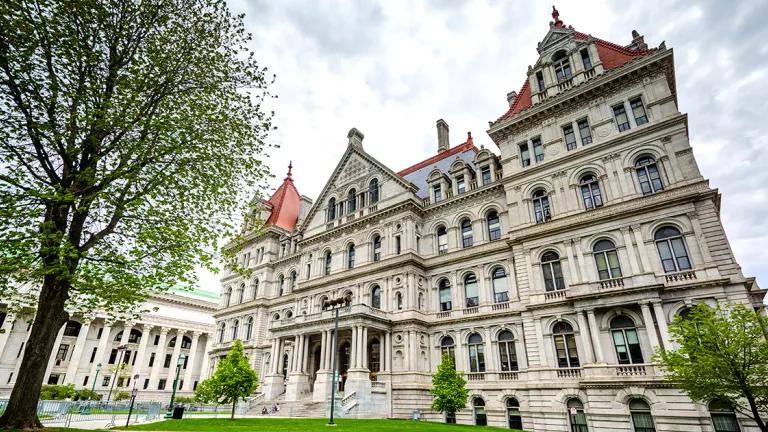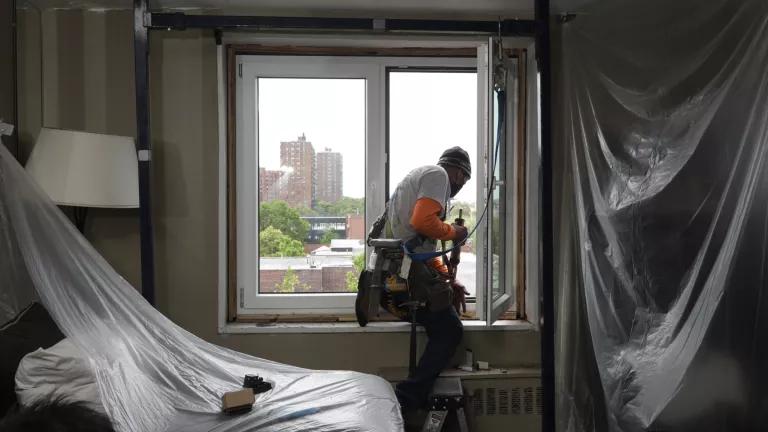Honolulu Votes to Build Back Better for Climate

A bright spot shone today in the Pacific, as Honolulu’s City Council unanimously passed a new building code that will reduce energy use, cut costs and carbon emissions, and boost Honolulu’s economic recovery with clean-energy jobs.
Bill 25, Honolulu’s new building energy code will cut energy use and costs for residents by requiring new buildings to be significantly more energy efficient. It will also make it easier and cheaper for residents to install solar panels and chargers for electric vehicles, enabling more people to harness the power of the sun.
Building a future with cleaner energy
Honolulu had not updated its building energy code since 2006; this was a long-needed update in a fast-evolving field. As buildings last for decades, making buildings less dependent on fossil fuels has benefits far into the future—for affordability, the climate, and public health.
As one of 25 cities participating in the Bloomberg Philanthropies American Cities Climate Challenge, Honolulu received technical assistance from The Solar Foundation, Forth, Greenlink, the Electrification Coalition, and NRDC. Local advocates, including youth leaders with Hawai’i Climate Strike, the Hawai‘i chapter of the Sierra Club, and the Blue Planet Foundation encouraged the City to adopt as ambitious a policy as possible. Hundreds of local residents also testified in support of a strong policy.
The State of Hawai‘i adopted the goal of 100% renewable energy by 2045; it was the first state in the nation to do so. This is a laudable and ambitious goal, and passage of Bill 25 is an important step forward.
Here are the three things the new code will require of new buildings:
- Energy-efficiency and lower costs: In the land of trade winds, the gentle breezes that blow steadily across the Hawaiian Islands, Bill 25 allows natural cooling systems to take advantage of the local climate. It provides builders more flexibility to use super-efficient tropical building standards and rewards simple tools such as fans, extra window glass where appropriate, and shaded walls. It also encourages compact homes, efficient appliances, and large lanais.
Not only will these efficiency measures reduce energy use significantly and so reduce emissions, they will also reduce costs for residents, potentially cutting monthly utility bills in half.
- Solar-ready roofs: The new code also requires roofs to be “solar-ready,” which means putting wiring in place to enable residents to more easily install solar panels if they choose to in the future.
- Solar water heating: The bill originally required solar water heating—a measure that saw major opposition from Hawaii Gas, the state’s natural gas utility (owned by a multinational corporation). A 2008 state law already required that home water heaters use solar power instead of fossil fuels in the form of natural gas, but a loophole had allowed thousands of homes to be built with gas-powered water heating. Earthjustice and others challenged and finally closed that loophole in the courts; the city law no longer includes this provision as the state law is now stronger.
- Solar water heating: The bill originally required solar water heating—a measure that saw major opposition from Hawaii Gas, the state’s natural gas utility (owned by a multinational corporation). A 2008 state law already required that home water heaters use solar power instead of fossil fuels in the form of natural gas, but a loophole had allowed thousands of homes to be built with gas-powered water heating. Earthjustice and others challenged and finally closed that loophole in the courts; the city law no longer includes this provision as the state law is now stronger.
- EV-ready parking: The code also requires new buildings to make a portion of parking “EV-ready” so that the wiring is ready to install chargers for electric vehicles. Without this, building owners would need to tear out walls and redo electrical wiring at costs of thousands of dollars. This helps to “future-proof” parking for homes and businesses so that people can better meet the growing demand for electric vehicles in Hawai‘i.
A note on that EV-ready parking: Most buildings will now be required to make 25% of parking spaces EV-ready. The new code also includes a point system to provide more flexibility in how developers meet this requirement, with a few “discount” exceptions. An earlier draft of the bill gave affordable housing one of these exceptions, with a proposed 10% requirement as opposed to a 25% requirement, but the final bill makes no requirement of EV readiness at all for development targeting up to 100% of area median income. Residents of affordable housing should have access to convenient electric vehicle charging just like anybody else, and this need will likely grow in the future. Though many electric cars are relatively expensive today, their prices are dropping and, already, used electric cars are more affordable than many people may realize. In addition, electric car maintenance costs are far lower and it is much cheaper to power a car with electricity instead of gas. Residents of more affordable housing should also have access to home charging for this increasingly affordable transportation option.
Demand for climate action
Honolulu residents show strong support of action on climate, including actions people can take themselves. In a 2019 poll, the two most popular actions people said they were willing to take were installing solar panels and getting electric cars. Honolulu already has a high market share of electric vehicles. But as in many cities, the lack of access to places to charge those vehicles, and charge them quickly, is a barrier to more people starting to drive cleaner cars. Bill 25 helps lower the barriers both to installing electric vehicle chargers and installing solar panels to power them with—a combination of actions that can slash transportation costs for residents.
Much-needed job creation
In recent years, clean energy has been one of the country’s biggest and fastest-growing employment sectors, growing by 10 percent between 2015 and 2020 until the current downturn. In Hawai‘i, there are already four times as many energy efficiency jobs as fossil-fuel jobs. According to a 2019 Environmental Entrepreneurs report, Hawaii has only 3,195 fossil fuel jobs and 13,927 clean energy jobs (including in 6,083 energy efficiency and 4,830 in solar). The jobs needed to help buildings comply with Bill 25 will be an important addition to Honolulu’s economic recovery—one that builds back better, for a more sustainable, resilient island.
Better for the climate, better for people
As an island city, Honolulu is particularly vulnerable to climate change, and residents are already feeling its effects. From hotter temperatures to more frequent storms, “rain bombs,” and hurricanes, from ailing coral reefs to rising sea levels, the impacts are becoming ever more apparent. Bill 25 sets Honolulu on a path to build toward a more climate-friendly future. Buildings are the source of about 40% of climate-polluting emissions nationally; Bill 25 puts them on a path to reduce emissions significantly.
Especially given Hawai’i’s vulnerability to climate change, it is shocking—even to me, as someone who grew up in Hawai‘i—that Hawai‘i is the most oil-dependent state in the nation.
As the world’s most isolated set of islands, Hawai’i must import oil across thousands of miles of ocean. The cost and risk involved are staggering: an estimated $5 billion per year. In addition to this sky-high cost, add the risk of spills across thousands of miles of open oceans and precious reefs—and the pollution of air and water caused by the fossil fuels burned to transport all that fossil fuel and then burn it in Hawai‘i. These costs are too high, both for the local economy and for people’s health.
There’s a better way. Use less energy, and use cleaner energy. By requiring energy-efficient building techniques and appliances and renewably supplied electric vehicles, the new energy code will help Honolulu switch to cleaner power that will save money and save lives.



